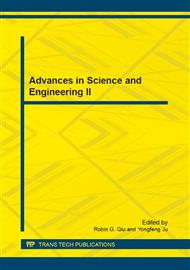[1]
T. Zhou, J. Ren, M. Medo, Y. C. Zhang, Bipartite network projection and personal recommendation, Phys Rev E. 76 (2007) 046115.
DOI: 10.1103/physreve.76.046115
Google Scholar
[2]
W. Hill, L. Stead, M. Rosenstein, G. Furnas, Recommending and Evaluating Choices in a Virtual Community of Use, Proc. Human Factors in Computing Systems, 1995, pp.194-201.
DOI: 10.1145/223904.223929
Google Scholar
[3]
J. Liu, T. Zhou, B. H. Wang, Progress of the personalized recommendation systems, Progress of Nature and Science 19 (2009) 1-15.
Google Scholar
[4]
P. Resnick, N. Iacovou, M. Suchak, P. Bergstrom, J. Riedl, GroupLens: An open architecture for collaborative filtering of netnews, Proc. Computer Supported Collaborative Work, Eds. ACM, 1994, p.175–186.
DOI: 10.1145/192844.192905
Google Scholar
[5]
J. Herlocker, J. Konstan, A. Borchers, J. Riedl, An Algorithmic Framework for Performing Collaborative Filtering, Proc. SIGIR. Research and development in information retrieval, 1999, pp.230-237.
DOI: 10.1145/312624.312682
Google Scholar
[6]
J. A. Konstan, B. N. Miller, D. Maltz, J. L. Herlocker, L. R. Gordon, J. Riedl, GroupLens: Applying Collaborative Filtering to Usenet News, Comm. ACM, 40 (1997) 77-87.
DOI: 10.1145/245108.245126
Google Scholar
[7]
B. Sarwar, G. Karypis, J. Konstan, J. Riedl, Item-based collaborative filtering recommendation algorithms, Proc. 10th International World Wide Web, 2001, pp.285-295.
DOI: 10.1145/371920.372071
Google Scholar
[8]
U. Shardanand, P. Maes. Social Information Filtering: Algorithms for Automating Word of Mouth", Proc. CHI, 95, 1995, pp.210-217.
DOI: 10.1145/223904.223931
Google Scholar
[9]
Z. Huang, D. Zeng, H. Chen, A Comparison of Collaborative-Filtering Recommendation Algorithms for E-commerce, IEEE Intelligent Systems, 22 (2007) 68-78.
DOI: 10.1109/mis.2007.4338497
Google Scholar
[10]
J. Delgado, N. Ishii, Memory-Based Weighted-Majority Prediction for Recommender Systems, Proc. ACM SIGIR'99. Workshop Recommender Systems: Algorithms and Evaluation, 1999, p.1–5.
Google Scholar
[11]
B. M. Sarwar, G. Karypis, J. A. Konstan, J. T. Riedl, Application of Dimensionality Reduction in Recommender System - A Case Study, Proc. ACM WebKDD Workshop, (2000).
DOI: 10.21236/ada439541
Google Scholar
[12]
F. Wang, P. Li, Efficient Nonnegative Matrix Factorization with Random Projections, Proc. 10th SIAM International Conference on Data Mining, 2010, pp.281-292.
DOI: 10.1137/1.9781611972801.25
Google Scholar
[13]
T. Li, J. D. Wang, A Privacy-Preserving Collaborative Filtering Algorithm Based on Non-negative Matrix Factorization, Information and Control 37 (2008) 660-664.
Google Scholar
[14]
L. Ungar, D. P. Foster, A formal statistical Approach to Collaborative Filtering, Proc. CONALD'98.
Google Scholar
[15]
T. Hofmann, Latent Semantic Models for Collaborative Filtering, ACM Trans on Information Systems 22 (2004) 89-115.
DOI: 10.1145/963770.963774
Google Scholar
[16]
B. Marlin, Modeling User Rating Profiles for Collaborative Filtering, Proc. Neural Information Processing Systems (NIPS' 03), 16(2003), pp.627-634.
Google Scholar
[17]
K. Goldberg, T. Roeder, D. Gupta, C. Perkins, Eigentaste: A Constant Time Collaborative Filtering Algorithm, Information Retrieval J. 4 (2001) 133-151.
Google Scholar
[18]
I. T. Jolliffe, Principal Component Analysis. John Wiley and Sons Ltd, (2002).
Google Scholar
[19]
Information on http: /www. snl. salk. edu/~shlens/pca. pdf.
Google Scholar
[20]
J. G. Liu, T. Zhou, Q. Guo, B. H. Wang, Overview of the Evaluated Algorithms for the Personal Recommendatin Systems, Complex Systems and Complexity Science, 6 (2009) 1-10.
Google Scholar
[21]
Y. Y. Yao, Measuring retrieval effectiveness based on user preference of documents, Journal of the American Society for Information Science 46 (1995) 133–145.
DOI: 10.1002/(sici)1097-4571(199503)46:2<133::aid-asi6>3.0.co;2-z
Google Scholar


